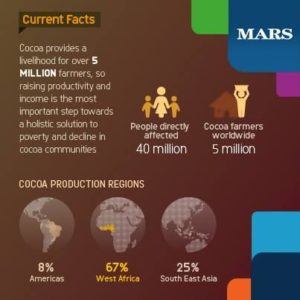Mars: The supply of chocolate is melting away


Less chocolate:
The global supply of chocolate is in danger. Cacao trees, responsible for the delicious chocolate we all love, require very specific conditions to prosper. As such, Chocolate is largely grown in areas within ~10 degrees of the equator.[i] In fact, over two thirds of the world’s supply of chocolate is grown in West Africa, an area already plagued by the growing challenge of drought.[ii] Howard-Yana Shapiro, Global Head of Plant Science and Research for Mars, the largest chocolate company in the world, said “Cote d’Ivoire is the largest producer of cocoa in the world. Mars has bought cocoa from there for sixty years. … In 10 years, under a 2% increase in consumption we will need (an area corresponding to) another Cote d’Ivoire”.[iii] In fact, Mars believes that global demand could outweigh global supply by over a million tons by 2020.[iv]
Mars’ response:
Mars has committed to invest $1 billion to combat climate change through their “Sustainable In A Generation” initiative. Within their global supply chain, Mars is focused on ending deforestation, saving water, and helping cocoa farmers build more profitable and sustainable businesses.
- Deforestation: Mars has published extensive sourcing policies, including purchasing all raw materials from legal sources and mandating no burning to clear land for new developments or to re-plant existing developments, that will require the company to change suppliers if a supply chain partner does not adhere to their documented sustainable standards. By doing so, Mars has combined their proactive sustainable initiative with their significant power in the channel to focus their purchasing leverage to penalize negative practices.[v]
- Saving Water: Similar to their deforestation standards, Mars is impacting the water shed. If interventions don’t help relieve stress on a local watershed, Mars is prepared to abandon that source of water to protect the natural habitat it supports.[vi]
- Helping Farmers: Today, it is estimated that cocoa farmers produce just 10% of their potential output assuming perfect conditions, compared to 60% for corn production. The opportunity to improve productivity is enormous. Mars is committed to helping the nearly 5 million small-scale cocoa farmers across the world through process improvement initiatives. In Cote d’Ivoire, Mars has set up Cocoa Development Centers designed to help farmers by providing improved planting materials fertilizers, and training in agricultural best practices. Today, they have 25 active centers serving 50,000 farmers, with a goal of reaching 150,000 (50 additional centers) of the 750,000 farmers by 2020.[vii] On a broader scale, in 2008 Mars, in partnership with IBM and the US Department of Agriculture, launched a project to sequence, assemble and annotate the genome of the cacao tree. Mars has taken a further step forward by releasing the conclusions from their studies so that breeders can identify traits of climate change adaptability. If this initiative can help farmers improve productivity – improvements in cocoa yield per parcel of land will dramatically change the supply/demand imbalance well into the future.[viii] Mars is also taking immediate steps to generate solutions by forming the “Farmer Income Lab”, a collaborative “think-do tank” tasked with designing insights and solutions to help create more sustainable practices for the smallholder farmers that operate within their supply chain. To further speed the flywheel of progress, these solutions will be shared throughout the industry to drive broader adoption. Their vision is to dramatically impact the practices of the estimated 200 million smallholder farmers that produce food within the world’s supply chain.[ix]
Recommendations:
- Incorporate sustainability ideals into Mars brands’ physical products: Mars has alluded to nourishing well-being, and creating healthier products, but there is currently a disconnect between the company values expressed in this sustainability project, and the branding for Twix, Snickers, M&M’s, and other Mars brands. By adjusting the product packaging and other aspects of the brand identity, it would display long-term commitment both internally and externally to the sustainability mission, which in turn would re-enforce stakeholder buy-in throughout the company, industry, and throughout the global supply chain.
- Create tangible KPI’s for the Farmer Income Lab: While I support giving this think-tank the freedom to innovate without creative restrictions, that ought not to relieve them from committing to measurable goals that would hold both this team and Mars accountable for results. I would suggest setting specific targets such as the number ideas generated, pilots initiated, and results driven with specific impact KPI’s for each. In the end there must be measures for solutions operationalized over the next 3-5 years.
Question that remains:
Should demand exceed the supply that conforms to Mars’ sustainability standards, will Mars have the will to negatively impact revenues and adhere to the values outlined above? If not, will the company sacrifice these aspirations and begin to source from suppliers who don’t meet their criteria? How will they handle what will assuredly be mounting pressure from shareholders?
(Word count: 798)
Work Cited:
[i] https://www.climate.gov/news-features/climate-and/climate-chocolate
[ii] https://www.yaleclimateconnections.org/2017/10/climate-change-could-hurt-chocolate-production/
[iii] http://www-03.ibm.com/ibm/history/ibm100/us/en/icons/cocoagene/
[iv] http://www.mars.com/global/about-us/policies-and-practices/cocoa-policy
[v] http://www.mars.com/global/about-us/policies-and-practices/deforestation-prevention-policy
[vi] http://www.mars.com/global/sustainable-in-a-generation/healthy-planet/water-impact
[vii] http://www.mars.com/global/sustainable-in-a-generation/our-approach-to-sustainability/raw-materials/cocoa#cocoa
[viii] http://www.mars.com/global/science-and-innovation/science/environment
[ix] http://www.mars.com/global/press-center/newsroom/smallholder-farms-research



Great article JJ! Mars is definitely facing a very interesting crossroad where they will have to balance short term profitability with a long term strategy that solidifies their position to lead the market in the future.
As consumers grow more aware of the environmental impact of their purchases, I agree with the author that moving the brands and their packaging to have an environmentally friendly image and perception could go a long way in the commoditized market of chocolates and sweets as a whole.
I find the last question that was posed by the author (what happens if the suppliers can’t catch up with demand?) particularly interesting, but have a different take on the potential outcome. In my perspective, Mars is already doing everything on their power to ensure that their approved providers increase their yield, even if they don’t come close to the 60% yield that other crops achieve, getting to 20% would allow them to double production which would be well ahead of the growth curve of demand.
A final comment, this is another example of companies that have perfectly aligned business and sustainability objectives. This alignment definitely ensures a higher chance of success and follow up on corporate responsibility activities, which in the end drives value for society.
Great topic JJ! The threat of the world running out of chocolate is one of the gravest challenges facing humanity. The question about how the firm would react in case of things going bad, is really pertinent.
In my opinion, in the unfortunate event of demand exceeding supply, I don’t see Mars conforming to its values and its sustainability standards. Hence, the firm would have no choice but to procure supplies from non-ideal sources and suppliers, at least in the short term. Having said that, it is also understandable that the situation will not occur overnight and the firm would be able to see the unfortunate day coming. This should give it enough runway to pivot on its approach and potentially double down on investments in its sustainability initiatives. In addition, this would also give it the time to communicate and align key stakeholders to set expectations and also prepare re-positioning and PR efforts for the brand. Let’s hope things work out, and the world does not run out of chocolate!
Nice article JJ. I would be very disappointed to see the world run out of chocolate.
Your question on shareholder pressure to source from suppliers who do not meet the sustainability standards is an interesting one. I am sure many shareholders would be disappointed by the negative short term financial impact that the company would see. However, if Mars has clearly communicated their intent to only source from sustainable suppliers and has a compelling case for the impact to the long term operations of the company, I find it difficult to believe that long term investors would be that upset. Yes, the short term results may not meet expectations, but if shareholders understand the threat to the business and industry I think there would be less pressure than you currently expect to see. It would be very interesting to see how this plays out if we do get to this sad state where I struggle to find chocolate to eat.
Though I am not a big chocolate bar fan, I enjoyed reading this article. Thanks JJ!
I agree with your recommendation that Mars’ branded products should incorporate more of its sustainability ideals. That said, I would be wary of altering the packaging too much too quickly; consumers are increasingly appreciative of sustainable practices, but a drastically different package may significantly reduce customer demand.
To further increase the number of cocoa suppliers with sustainable practices, Mars could work with the Cote d’Ivoire government to promote best practices. Given cocoa represents 30% of all exports ($3.75 billion) for the country, the government should have a vested interest in subsidizing training programs or offering tax incentives.
Furthermore, Mars should diversify away from chocolate based products, so that conforming to its sustainability standards may not result in reduced revenue. Just today, the company announced an investment in Kind, a leading snack bar provider. While Kind has some chocolate based products, the company offers bars without cocoa as well. Perhaps this minority investment in Kind is a preview for a full ownership transaction in the future.
Sources:
https://atlas.media.mit.edu/en/profile/country/civ/
https://www.nytimes.com/2017/11/29/business/dealbook/mars-kind-bars.html
Love the topic and the title of the essay!
To answer the first question, I think it is not easy to set such criteria. The demand is dynamic and will change based on the supply. With a decrease in Cocoa supply, it is very likely to cause an increase in chocolate price and in turn a drop in demand. Thus I think this should not be feasible to set such criteria for its sustainability project.
I do agree with the brand identity part. I think it is not only a tool to educate different stakeholders to buy in the idea but potentially also a source of fund to support its sustainability projects. Mars could conduct a price sensitivity analysis on its various product line, from high end to low end and determine if there’s a product, that the consumer cares more about the climate change and is less sensitive to the price. they could potentially make this a marketing campaign to encourage the consumer to spend 10 more cents on a product and have that revenue goes into supporting its sustainable project.
JJ,
Thank goodness we have you out there on that wall, saving us from the ravages of a chocolate-less future. While that may sound facetious, I want you to know that I’m 100% serious. I cannot even begin to explain how much more complicated anniversaries and such would be if this stuff wasn’t an option.
I have 2 questions as I read this article:
1) How much of a market share does Mars have in the chocolate world?
2) Do the other big players feel similarly about sustainability?
It seems that if another large player didn’t care, then they would simply need to work on changing the output from 10% to 60ish%, and then continuing to provide chocolate at the expense of the area from which it was sourced. In short, is it absolutely necessary to be sustainable to be more productive? Or could a less-conscious competitor ruin Mars best intentions?